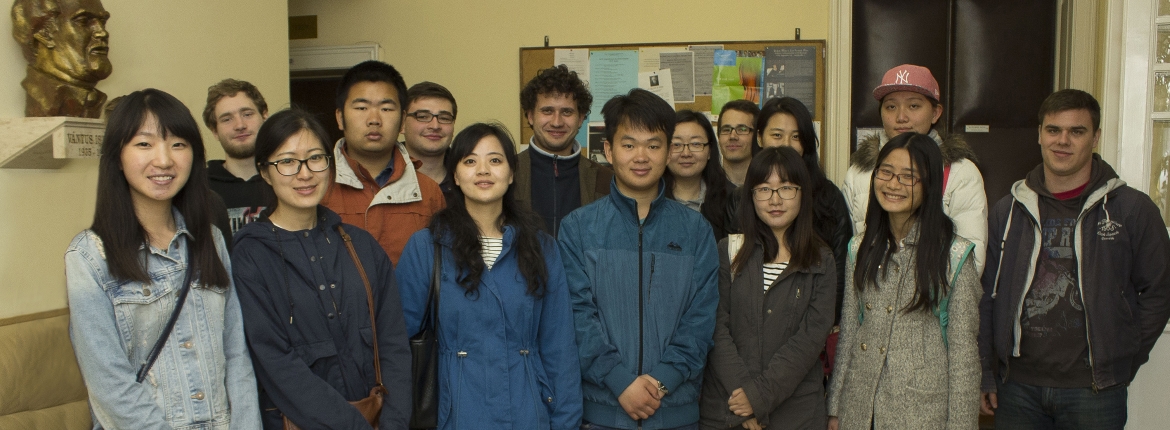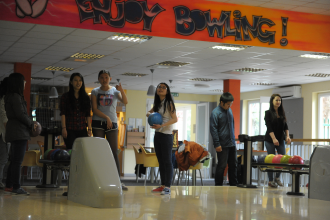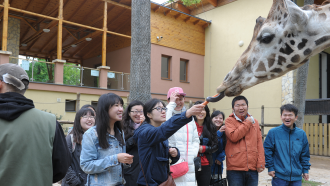
The Hungarian and Chinese students of the Faculty of Music of the University of Szeged explored Szeged together. Questions were asked to dean, Péter Tóth and pianist Anikó Szokody about the internalization plans of the faculty.
The Faculty of Music of SZTE and the Konfucius Institute arranged for a Chinese-Hungarian friendship day on 29th April, 2015 in order to bring the Chinese students closer to the university and to have the Hungarian and Chinese students get to know each other and the opportunities offered by the city and the university. They visited the Szeged Zoo, played bowling and had a karaoke party together.
There is an increasing number of Chinese students at the Faculty

At present five Chinese students major in piano, guitar and singing at the Faculty. ”This is a considerably large number because we had only one Chinese student on average per semester. We invested a lot of work into increasing their number. The success of the job is proved by the fact that in the future one more student will major in horn to the university by the Tisza river”- said Péter Tóth. The dean added: no exchange programs exist between the faculty and the faculties of Chinese universities. Students studying here usually come at their own expense paying for their tuition as BA students. “At the moment we are in contact with numerous Chinese recruitment agencies. The SZTE Konfucius Institute is a coordinator in the process; they help the translation of contracts, supports the administration of students during their stay in Szeged.” – said the dean.
How can the SZTE Faculty of Music be attractive for foreign students?
In relation to internalization Péter Tóth emphasized: it is very important for foreign students how highly the university is placed in world rankings. „SZTE has a top ranking spot in these lists. This is of high importance for the students because when they decide on their higher education they probably do not even know where Szeged is. The top ranking spot makes the university attractive.”- said Péter Tóth.
For the Chinese students it is a comforting feeling to know that within the university Konfucius Institute is in operation where they speak their language and know their culture. – he added. The management of the faculty visited two American universities under the flag of internalization where they had meetings with university superiors and gave a concert.
”Practice is the best example of what we can offer for student candidates. On the one hand we try to find partners through personal inquiry, on the other hand the employees of the faculty often give concerts in countries outside Europe and hold master courses. Such foreign opportunities make it possible to recruit new students.” – said Péter Tóth.
The dean of the Faculty added: in art education personal relationships and the personal example are factors of high importance. It is also important that the institute can transmit such an image that helps the decision of the foreign students.
”That is why the next huge task is to make such an English website that contains information for an American, a South-African or a Chinese student on the basis of which they can decide whether they should choose the University of Szeged.”- said the dean.
The musicality of the Chinese students – they find the works of Bartók difficult

According to Péter Tóth the Chinese students learning at the faculty are of different abilities: they very talented, enthusiastic and hard-working students with a good ear for musicality. Even though among the admission conditions English language knowledge is not obligatory, there are still linguistic difficulties. The faculty supports their foreign students in this respect as well; those who want to, are signed up for English courses and English study material is also provided for the preparation for the exams. They continually help them in extending their musical vocabulary.
Anikó Szokody, instructor of the SZTE Faculty of Music, teaches two Chinese pianists. “The difference in the structure of music education between the two countries is evident. Students come with various musical competence, theoretical backgrounds and levels of English knowledge” –said the piano teacher. She added: this partly comes from the culture of the two countries that the Chinese students are very precise and focus especially on the details. The have an excellent work morale; they record all the class s and listen to them several times. The fantastic work morale is paired up with the fact that Chinese students respect their master to a maximum extent.
“We can add the plus elements of our music culture, the phrasing of free ideas and their integration into artistic form to this. It is a continuous challenge to work with Chinese students but their enthusiasm makes the teaching job easy.”- said Anikó Szokody. The teacher also said that during their studies at home played very few Hungarian musical pieces. They rather know the classics, for example the works of Chopin, Mozart and Bach. During their studies in Szeged, the works of Ferenc Liszt and Béla Bartók are also taught to them; however – different from Hungarian students who have the performing method of a Bartók piece in their blood – Chinese students find these piano pieces difficult.
SZTEinfo

